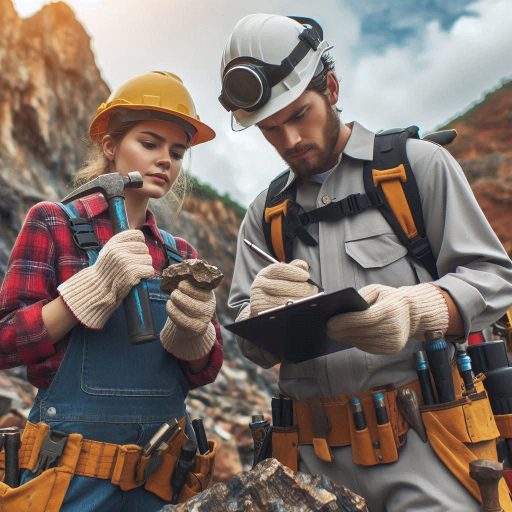Introduction
Importance of Geological Technicians in the Field of Geology
Geological technicians play a crucial role in the field of geology.
They support geologists by providing essential data and technical expertise, making their contributions fundamental to understanding Earth‘s processes and managing natural resources.
Their work ensures that geological projects are based on accurate and reliable information.
The Roles and Duties That Geological Technicians Perform
Geological technicians are responsible for a variety of tasks.
They conduct field surveys to collect geological samples and data, operate specialized equipment, and ensure its proper maintenance.
They assist in analyzing samples and interpreting results, contributing to environmental assessments and resource exploration.
Their role is pivotal in obtaining and processing the data that geologists rely on for their research.
Why Geological Technicians Are Essential to the Success of Geological Projects
The success of geological projects heavily depends on geological technicians.
They provide critical support by ensuring accurate data collection and equipment functionality.
Their expertise allows for precise analysis and effective resource management, making their role indispensable in advancing geological studies and achieving project goals.
Without their contributions, many geological projects would face significant challenges.
Education and Training Required
The Educational Background Needed to Become a Geological Technician
Becoming a geological technician begins with a solid educational foundation.
Most positions require an associate‘s degree in geological technology or a related field.
Degrees in earth sciences, geology, or environmental science are also common.
These programs include courses in geology, mineralogy, and field techniques.
Students also study laboratory methods and data analysis.
A strong background in mathematics and chemistry is essential.
This academic preparation equips technicians to analyze samples and interpret geological data effectively.
Information on the Certifications and Licenses That May Be Required
Certifications can significantly enhance career prospects for geological technicians.
The American Association of Petroleum Geologists (AAPG) offers certification programs that validate a technician‘s expertise.
While certifications are not always mandatory, they can improve job opportunities and demonstrate professional commitment.
Additionally, some states or employers may have specific licensing requirements.
Check local regulations to understand any necessary licenses in your area.
Licensure typically involves passing an examination and meeting experience requirements.
This ensures adherence to professional standards and regulations.
Specialized Training Programs That Are Available for Aspiring Geological Technicians
Specialized training programs are available for those seeking focused skills.
Advanced programs offer training in areas such as environmental assessment or mining technology.
These programs provide hands-on experience with advanced equipment and cover specialized topics like geospatial analysis or remote sensing.
Professional organizations often offer continuing education opportunities to help technicians stay current with industry trends and technological advancements.
Networking through these organizations can also lead to job opportunities and career growth.
Internships during studies are highly recommended.
They provide practical experience and help build professional connections.
Internships allow students to apply theoretical knowledge in real-world scenarios.
Developing strong analytical and problem-solving skills is crucial.
Technicians work with complex data and must interpret results accurately.
Attention to detail and the ability to work collaboratively in teams are also important.
Overall, a combination of relevant education, certifications, and specialized training prepares individuals for a successful career as a geological technician.
Continual learning and adaptation to new technologies will further enhance career prospects in this dynamic field.
Read: Field vs. Office Work in Surveying and Mapping
Fieldwork Responsibilities
The Fieldwork Tasks That Geological Technicians Are Responsible For
Geological technicians perform a variety of critical tasks during fieldwork.
They collect soil, rock, and water samples from various locations.
These samples are essential for analysis back in the laboratory.
Technicians also conduct surveys to assess geological features and environmental conditions.
They use specialized equipment like GPS devices and soil augers to gather accurate data.
Additionally, technicians monitor field conditions to ensure safety and proper sampling techniques.
Their work involves extensive travel to different sites, often in challenging terrains and weather conditions.
How Geological Technicians Work Alongside Geologists in the Field
Geological technicians play a supportive role alongside geologists during fieldwork.
They assist geologists in planning and executing field investigations.
Technicians help set up and calibrate equipment needed for geological surveys.
They also aid in recording observations and taking measurements as directed by geologists.
While geologists analyze the broader geological context, technicians focus on detailed data collection and preliminary analysis.
This collaboration ensures that field data is accurate and comprehensive, contributing to the overall success of the geological study.
Examples of Fieldwork Duties Such as Collecting Samples, Conducting Surveys, and Documenting Findings
Fieldwork duties for geological technicians include several key activities:
- Collecting Samples: Technicians gather soil, rock, and water samples from designated locations.
They use tools like core samplers and hand tools to obtain representative samples. - Conducting Surveys: Technicians perform surveys to map geological formations and document surface features.
They use GPS devices and survey instruments to measure distances and elevations accurately. - Documenting Findings: Technicians meticulously record field observations, including environmental conditions and sample locations.
They document data in field notebooks or digital devices, ensuring all information is detailed and organized.
These tasks are fundamental to understanding geological processes and assessing environmental conditions.
The data collected by technicians supports geologists in making informed decisions and drawing accurate conclusions.
Their fieldwork contributions are vital to successful geological research and exploration projects.
Read: Importance of Accuracy in Surveying and Mapping
Laboratory Duties
The Laboratory Responsibilities of Geological Technicians
Geological technicians have several key responsibilities in the laboratory.
They prepare and process samples collected from the field.
This includes washing, drying, and sometimes crushing or grinding samples to prepare them for analysis.
Technicians also conduct tests to determine the physical and chemical properties of these samples.
They maintain and calibrate laboratory equipment to ensure accuracy.
Additionally, technicians record and manage data from experiments and analyses, ensuring that all information is properly documented and organized.
The Various Laboratory Techniques and Equipment That Are Used in Geology
Geological technicians use a range of laboratory techniques and equipment.
Microscopy is used to examine mineral and rock samples in detail.
X-ray diffraction (XRD) helps identify mineral compositions.
Scanning electron microscopes (SEM) provide high-resolution images of mineral surfaces.
Spectroscopy techniques, such as atomic absorption and inductively coupled plasma (ICP), analyze the chemical composition of samples.
Thin section petrography involves slicing rocks into thin sections to observe their microscopic features.
Equipment like rock crushers, grinders, and sieves are used to prepare samples.
Each technique and tool plays a crucial role in understanding the geological characteristics of the samples.
How Geological Technicians Analyze Samples and Data in the Lab to Support Geological Research
Geological technicians analyze samples by conducting a variety of tests.
They use microscopy to identify mineral structures and textures.
X-ray diffraction (XRD) helps determine the mineral composition of rock and soil samples.
Technicians use spectroscopy to measure the concentration of elements in the samples, which can reveal information about the geological history and conditions.
After conducting these analyses, technicians interpret the data to identify patterns or anomalies.
They compare results with existing geological models and data to support or refine geological theories.
This analysis helps geologists understand the formation processes, mineral deposits, and environmental conditions related to the samples.
Accurate data from the lab is essential for making informed decisions in geological research, resource exploration, and environmental assessments.
Therefore, geological technicians play a crucial role in both field and laboratory settings.
Their responsibilities ensure that samples are properly collected, analyzed, and interpreted, providing valuable data that supports geological research and exploration.
Read: Surveying and Mapping Technician: Job Satisfaction

Data Analysis and Reporting
The Role of Geological Technicians in Data Analysis and Reporting
Geological technicians play a crucial role in data analysis and reporting.
They process and analyze data collected from fieldwork and laboratory tests.
Technicians use software tools to input, organize, and visualize data, making it easier to interpret.
They prepare detailed reports that summarize their findings, including graphs, charts, and tables.
These reports are essential for communicating results to geologists, project managers, and stakeholders.
Technicians ensure that data is presented clearly and accurately, supporting the decision-making process in geological studies and projects.
How Geological Technicians Organize and Interpret Geological Data
Geological technicians organize data by categorizing and structuring it systematically.
They create databases and spreadsheets to manage large volumes of information efficiently.
For instance, field data might be organized by location, sample type, and time of collection.
In the lab, data is sorted based on test results and sample properties.
Interpretation involves analyzing patterns and trends within the data.
Technicians compare new results with existing geological models to identify correlations or discrepancies.
They use statistical tools and data visualization techniques to make sense of complex data sets.
This analysis helps in understanding geological processes, assessing resource potential, and evaluating environmental impacts.
The Importance of Accurate Reporting in Geological Studies and Projects
Accurate reporting is vital in geological studies and projects for several reasons.
Clear and precise reports ensure that all findings are communicated effectively to decision-makers and stakeholders.
Accurate data helps in making informed decisions about resource management, environmental protection, and project planning.
Inaccurate or misleading reports can lead to costly errors and potentially impact safety, regulatory compliance, and project outcomes.
Furthermore, well-documented reports provide a reliable record of the research process and findings.
This documentation is valuable for future reference, enabling others to review, replicate, or build upon the work.
Most importantly, precise reporting by geological technicians underpins the integrity and success of geological research and projects, making it a critical component of their role.
Read: Online Courses for Surveying and Mapping Technicians
Transform Your Career Today
Unlock a personalized career strategy that drives real results. Get tailored advice and a roadmap designed just for you.
Start NowEquipment Maintenance
The Importance of Equipment Maintenance in the Work of Geological Technicians
Equipment maintenance is crucial for geological technicians to ensure reliable and accurate results.
Well-maintained equipment operates more efficiently and reduces the risk of errors during data collection and analysis.
Regular maintenance helps prevent breakdowns and extends the lifespan of costly instruments.
It also ensures that all tools and machines perform to their specifications, which is essential for obtaining precise data.
Proper maintenance is vital for the credibility of geological studies and for maintaining the safety and efficiency of laboratory and fieldwork operations.
Examples of the Types of Equipment Used by Geological Technicians
Geological technicians use a variety of specialized equipment, including:
- Rock Crushers: Used to break down large rock samples into smaller, manageable pieces.
- Grinders and Mills: Used to further process rock and soil samples into fine powders.
- Spectrometers: Such as atomic absorption and inductively coupled plasma (ICP) spectrometers for analyzing chemical compositions.
- Microscopes: Including light microscopes and scanning electron microscopes (SEM) for examining mineral samples.
- X-ray Diffraction (XRD) Equipment: For identifying mineral compositions in rocks and soils.
- GPS Devices: Used for precise location tracking and mapping during field surveys.
- Soil Augers: Employed to collect soil samples from different depths.
Each piece of equipment plays a specific role in the process of geological analysis and requires regular upkeep to function properly.
How Regular Maintenance and Calibration of Equipment Ensures Accurate Results in Geological Studies
Regular maintenance and calibration of equipment are essential for ensuring accurate results.
Maintenance tasks include cleaning, inspecting, and repairing instruments to prevent malfunctions and inaccuracies.
For instance, rock crushers and grinders must be kept free from debris to ensure consistent sample sizes.
Calibration involves adjusting equipment to maintain its accuracy over time.
For example, spectrometers and XRD machines need periodic calibration to ensure that they provide precise readings of chemical compositions and mineral structures.
Technicians follow manufacturer guidelines and use calibration standards to check and adjust equipment settings.
Accurate equipment directly impacts the reliability of data collected and analyzed.
Without proper maintenance and calibration, results can be skewed, leading to incorrect interpretations and potentially flawed conclusions in geological studies.
Therefore, meticulous upkeep of equipment is fundamental to the success and credibility of geological research and projects.
Safety Protocols
The Safety Protocols That Geological Technicians Must Adhere to in the Field and Laboratory
Geological technicians must follow strict safety protocols both in the field and the laboratory.
In the field, they need to wear appropriate personal protective equipment (PPE) such as helmets, gloves, and sturdy boots.
Safety harnesses may be required for working on steep or unstable terrain.
Technicians must also be trained in first aid and emergency response procedures.
In the laboratory, safety protocols include wearing lab coats, safety goggles, and gloves to protect against chemicals and sharp objects.
Proper ventilation systems, such as fume hoods, are essential for handling hazardous substances.
Technicians must follow procedures for the safe handling, storage, and disposal of chemicals and other potentially dangerous materials.
The Importance of Following Safety Guidelines to Prevent Accidents and Injuries
Following safety guidelines is crucial to prevent accidents and injuries.
Adhering to protocols minimizes the risk of exposure to hazardous materials and environments, protecting both technicians and the integrity of their work.
Safety guidelines help prevent incidents such as chemical spills, equipment malfunctions, or falls, which can result in serious injuries or even fatalities.
By consistently applying safety measures, technicians can ensure a safer working environment, reduce the likelihood of accidents, and maintain productivity without compromising health and safety.
Examples of Safety Measures That Geological Technicians Should Implement When Working in Potentially Hazardous Environments
When working in potentially hazardous environments, geological technicians should implement several safety measures:
- Field Safety: Use of PPE such as helmets and high-visibility clothing to protect against falling objects and improve visibility.
Carry a first aid kit and ensure that all team members are trained in basic first aid and emergency response.
Use safety equipment like fall arrest systems when working at heights. - Laboratory Safety: Adherence to standard operating procedures for handling chemicals, including the use of fume hoods and proper waste disposal methods.
Regular maintenance of safety equipment, such as eyewash stations and emergency showers, to ensure they are functional.
Proper labeling and storage of hazardous substances to prevent accidental exposure. - Equipment Safety: Regular inspection and maintenance of equipment to prevent malfunctions that could lead to accidents.
Use safety guards and follow operational guidelines to ensure safe handling of machinery like rock crushers and grinders. - Environmental Safety: Conduct risk assessments before starting fieldwork to identify potential hazards such as unstable ground or adverse weather conditions.
Develop and follow emergency evacuation plans for unforeseen situations.
Implementing these safety measures helps to create a safer work environment, protecting both personnel and equipment while ensuring the successful completion of geological tasks.
Delve into the Subject: Educational Pathways to Becoming a Mining Engineer
Communication Skills
The Importance of Effective Communication Skills for Geological Technicians
Effective communication skills are vital for geological technicians.
Clear communication ensures that tasks are understood and executed accurately.
It helps in conveying complex technical information in an understandable manner, both in written reports and verbal discussions.
Good communication reduces the likelihood of errors, facilitates problem-solving, and enhances teamwork.
For geological technicians, being able to explain findings, provide updates, and share insights effectively is crucial for the success of geological projects and the overall efficiency of operations.
How Geological Technicians Interact with Colleagues, Supervisors, and Clients
Geological technicians interact with various stakeholders, including colleagues, supervisors, and clients.
With colleagues, technicians collaborate on fieldwork and laboratory tasks, sharing information and coordinating efforts.
They may need to discuss data findings, resolve technical issues, or strategize on project approaches.
When working with supervisors, technicians report on progress, highlight any challenges, and seek guidance.
Effective communication with supervisors ensures that project objectives are met and any issues are addressed promptly.
Interactions with clients involve explaining technical data, discussing project outcomes, and addressing any questions or concerns.
Technicians must be able to present information clearly and professionally, translating complex geological concepts into terms that clients can understand.
The Role of Communication in Ensuring Smooth Collaboration on Geological Projects
Communication plays a key role in ensuring smooth collaboration on geological projects.
It helps synchronize efforts among team members, aligning their tasks and goals.
Regular updates and clear instructions prevent misunderstandings and ensure that everyone is on the same page.
Effective communication also facilitates the sharing of critical information, such as field observations and lab results, which are essential for making informed decisions.
It helps in coordinating project timelines, managing expectations, and addressing any issues that arise during the project.
In summary, strong communication skills enable geological technicians to interact effectively with colleagues, supervisors, and clients, fostering teamwork and collaboration.
Clear and consistent communication is crucial for the successful execution of geological projects, ensuring that tasks are completed efficiently and objectives are achieved.
Uncover the Details: Top Environmental Engineering Companies to Work For
See Related Content: Internship Opportunities for Aerospace Engineering Students
Conclusion
The Roles and Duties of Geological Technicians
Geological technicians play a vital role in Earth sciences.
They conduct field surveys, gather samples, and carry out essential analyses.
Their responsibilities include operating specialized equipment, ensuring precise measurements, and supporting geologists with accurate data.
They are involved in environmental assessments, resource exploration, and data interpretation, which are crucial for understanding geological processes and managing natural resources effectively.
The Importance of Geological Technicians in the Field of Geology
The importance of geological technicians is immense in geology.
They provide critical support to geologists by ensuring data reliability and operational efficiency.
Their expertise contributes significantly to advancing scientific research, resource management, and environmental protection.
Without their work, many geological studies and practical applications would lack the precision and depth needed for effective outcomes.
Career Opportunities as Geological Technicians and Learn More About the Profession
We encourage readers to explore a career as a geological technician.
This field offers diverse opportunities and the chance to make a meaningful impact.
By pursuing this profession, you can contribute to vital research, environmental conservation, and resource management.
Discover more about how you can play a crucial role in the world of geology.
[E-Books for Sale]
The Big Book of 500 High-Paying Jobs in America: Unlock Your Earning Potential
$19.99 • 500 High-Paying Jobs • 330 pages
Explore 500 high-paying jobs in America and learn how to boost your career, earn more, and achieve success!
See All 500 High-Paying Jobs of this E-Book
1001 Professions Without a Degree: High-Paying American Jobs You Can Start Now
$19.99 • 1001 Professions Without a Degree • 174 pages
Discover 1001 high-paying jobs without a degree! Unlock career tips, skills, and success strategies for just $19.99!




